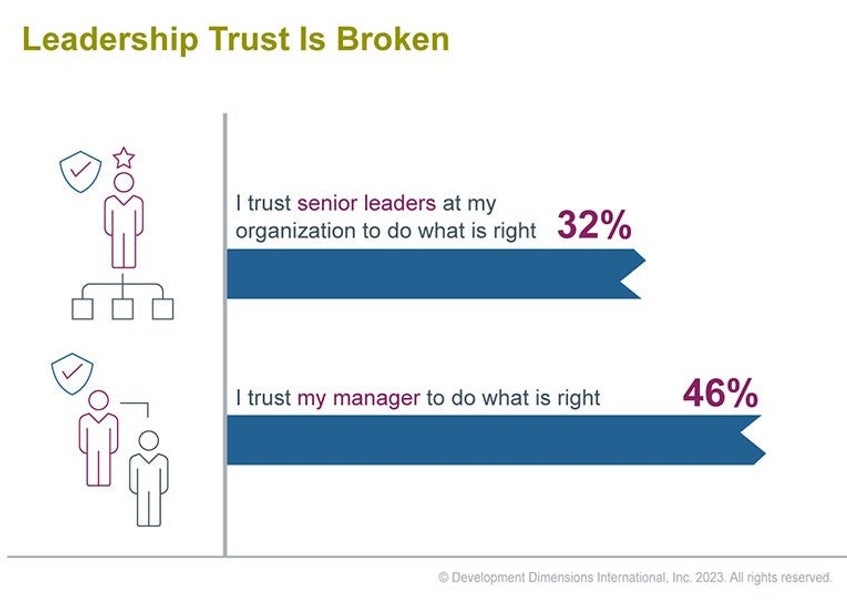Is trust within organizations on thin ground? According to DDI’s Global Leadership Forecast 2023, less than half of leaders trust their own manager to do what’s right. And less than a third say they trust senior leaders in their organization.
Furthermore, as shown in a recent survey by PWC, executives significantly overestimate how much they’re trusted, both by customers and employees. The same executives also say the biggest challenge to building trust is company culture. In fact, only 34% of employees said the leaders of their company gave appropriate attention to earning trust.

In the realm of leadership, trust is the cornerstone upon which strong relationships, effective collaboration, and organizational success are built. It’s about building a culture and environment of trust that people can count on. Without trust, teams falter, morale diminishes, and progress stagnates.
Effective leaders understand that communication plays a pivotal role in fostering trust within their teams and across their organizations. By employing intentional strategies and embodying key principles, leaders can communicate in ways that cultivate trust among their followers.
Here’s how:
1. Transparency and Openness
Transparency breeds trust. Leaders who are transparent and open in their communication build credibility and demonstrate integrity. Share relevant information openly, even when it’s difficult or uncomfortable. Transparency includes being honest about both successes and failures, as well as the reasoning behind decisions. When employees feel informed and included, they are more likely to trust their leaders and feel a sense of ownership in the organization’s goals.
2. Active Listening
Effective communication is a two-way street, and active listening is an essential component. Leaders who listen attentively to their team members demonstrate respect and empathy. Encourage open dialogue, ask thoughtful questions, and genuinely consider others’ perspectives. By showing that their input is valued and their voices heard, leaders foster a culture of trust where individuals feel understood and appreciated.
3. Consistency
Consistency in communication builds predictability and reliability, key elements of trust. Leaders should strive to communicate consistently across various channels and contexts. Consistency in messaging, behavior, and decision-making helps establish credibility and reinforces the leader’s commitment to their values and objectives. When employees know what to expect from their leaders, they feel more secure and confident in following their guidance.
4. Empathy and Understanding
Empathetic leaders forge deeper connections with their teams and inspire trust by demonstrating genuine care and understanding. Take the time to empathize with employees’ concerns, challenges, and emotions. Acknowledge their experiences and validate their feelings. Leaders who show empathy create a supportive environment where individuals feel valued and respected, leading to stronger bonds and higher levels of trust.
5. Accountability
Accountability is essential for building trust within teams. Leaders must hold themselves and others accountable for their actions, decisions, and commitments. When mistakes occur, leaders should take ownership, apologize if necessary, and work to rectify the situation transparently. By demonstrating accountability, leaders reinforce their integrity and commitment to upholding shared values and standards, which fosters trust among team members.
6. Authenticity
Authenticity is a hallmark of trustworthy leadership. Leaders who are genuine, sincere, and true to themselves inspire confidence and loyalty in their followers. Avoiding pretense and being authentic in communication builds rapport and fosters an environment where individuals feel safe to be themselves. Authentic leaders are more relatable and approachable, which strengthens connections and deepens trust within the team.
In Conclusion
Effective leadership communication is instrumental in building and maintaining trust within organizations. By prioritizing transparency, active listening, consistency, empathy, accountability, and authenticity, leaders can create a culture of trust where employees feel valued, respected, and empowered. Trust is not built overnight but is cultivated through sustained effort, integrity, and genuine human connection. Leaders who prioritize trust in their communication will foster stronger relationships, drive higher performance, and achieve greater success in the long run!

